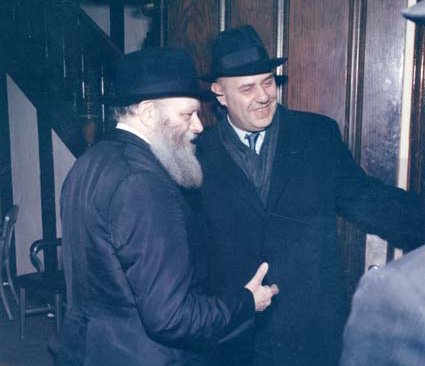|
|

|
"Is That why You Chose Brooklyn?"
by Portraitofaleader.org
|
Rebbe, why didn't Chabad establish its headquarters in Israel? Are you not concerned with assimilation? These questions feature in a private audience between the Rebbe and the Directors of the Hillel Foundation, in August 1959.
Q: Why didn't the Lubavitcher movement choose to go to Israel instead of the U.S.? 
R: The Lubavitcher movement came to the U.S. in 1940, when the British Mandate was in full power. If you have a certain amount of energy and it is your intention to use it to a maximum of efficiency, you must apply it where it can be used to maximum efficiency.
Q: Do you mean that there are more Jewish people here that will be helped by your ideals?
R: There is more possibility to help more people in Brooklyn than in Tel Aviv.
Q: Is that why you chose Brooklyn, and not some other city like Chicago?
R: The real reason is because my father-in-law wanted a place where he could influence a great number of students. And this can be done more easily in Brooklyn than in Baltimore or Chicago.
Q: If the British Mandate had not been in Israel, would he have chosen Israel?
R: I don't believe so; you do not have the possibilities there that you have in the United States.
Q: Lubavitch is systematic, and the neo-Orthodox in Israel do not have some of the frustrations of the Jews in galut (exile).
R: It has no connection with being Orthodox or systematic. It deals with choosing a spot where you have no help or choosing a spot where you can rest twelve or fifteen hours a day. It doesn't depend upon the ideal but whether the human being is seeking an easy way out or seeking to accomplish something, and in a certain period of time. My father-in-law always sought something that was difficult to perform, that no one wanted to do voluntarily, and began by doing something revolutionary.
In 1940, Orthodoxy in the U.S. was going down. In Israel, it was going up, and in Europe it was at the same level more or less. When my father-in-law first heard that the Hasidim were trying to bring him to the U.S., his first thought was that this is a place where his energies can best be applied. Neo-Orthodoxy is trying to fight assimilation while it is still only a seed, as it is much easier to annihilate something when it is beginning than after it is fully grown.
Q: Are you not concerned with assimilation?
R: That is our prime interest. Twenty years ago there were three reasons for assimilation: 1) escape . . . 3) rescue. Now assimilation is looked down upon by all three groups.
Q: I came across a great amount of children who expressed bitterness against their parents. Can you suggest an approach to turn this bitterness into love?
R: Although there is no general remedy that will apply to each individual, nevertheless there is one common point. In growing up he must encounter difficulties and obstacles in his way—the world is changing, his body is changing, and this presents obstacles to him. He needs someone for a scapegoat, ashma. The only person who has been with him all his life is his parent, and if he has no strength of character to say to himself that he must overcome these obstacles—even if it is connected with the biggest event in his life—then he must find someone to put the finger on. His road is not easy to go on. He must choose his father and mother to blame, because he knows his teacher only one or two years and he experienced these difficulties before that. If he can put his finger on his mother or father, he has a perfect excuse.
Explain to your audience the real reason they choose their parents for their accusations, but do not stress this point too hard. Tomorrow or the day after tomorrow they will be less bitter. Do not expect them to stand up on the first day and say "ashamnu (I have sinned)."
|
|
|
|
|
